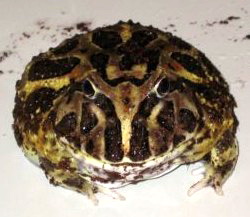Cranwell's horned frog
From Wikipedia, the free encyclopedia
[Photo] This is a photo of George (12/?/2000???12/29/2004), our beloved Cranwell's horned frog, when she was about three years old. Taken by Diberri http://en.wikipedia.org/wiki/User:Diberri
Cranwell's horned frog (Ceratophrys cranwelli), also called the Chacoan horned frog, is a terrestrial frog endemic to the dry Gran Chaco region of Argentina. Like most members of the genus Ceratophrys, they are often considered Pacman frogs because of their uncanny resemblance to the popular video game character of the same name. Most adult species range from 8-13 cm long (3-5 in) and can weigh up to 0.5 kg (1 lb).
The backs of these frogs typically have dark green and brown coloration, although albino variants with orange and yellow backs also exist. The dark color scheme aids in camouflaging the animal as it burrows and waits for its prey. Though generally inactive, they are aggressive eaters, and are capable of leaping for several body lengths in order to capture prey.
Cranwell's are nocturnal and rest with their eyelids open. They are ordinarily carnivorous, feeding mostly on insects and like-sized animals, and are known to cannibalize other frogs.
At extreme temperatures, Cranwell's frogs enter a period of estivation, developing a thick layer of protective skin to trap moisture and aid in respiration. When estivation is complete, the frog uses its front and hind legs to help shed the protective layer. In many cases, the frog uses its jaws to help pull the skin over its back, often eating the skin in the process.
Like many Pacman frogs, Cranwell's are very popular as pets. As such, they should be kept in a humid environment such as an aquarium with moist substrate (not gravel). They should be fed a mixed diet of gut-loaded crickets, mealworms, small mice, and feeder fish. As a rule of thumb, these frogs should be fed every 2-3 days until the age of 18 months, at which point they should be fed once every 10-14 days.
Because of their large mouths, these frogs are particularly susceptible to impaction, a condition whereby the frog's gastrointestinal tract is obstructed by a foreign body accidentally swallowed. The foreign body can be almost anything, but in Pacman frogs kept as pets, it is commonly a small rock or piece of gravel used as substrate. Impaction often leads to constipation and malnutrition, and possibly death unless treated promptly with laxatives such as the osmotic diuretic lactulose. In severe cases, the volume of feces in the intestines is so large that the lungs are obstructed and the frog's breathing is impaired. Surgery is often the only alternative in these cases, although it is rarely performed because of its typically prohibitive costs.
http://en.wikipedia.org/wiki/Cranwell%27s_horned_frog
| The text in this page is based on the copyrighted Wikipedia article shown in above URL. It is used under the GNU Free Documentation License. You may redistribute it, verbatim or modified, providing that you comply with the terms of the GFDL. |
|

